

To Stick to a Bedtime, Think of Sleep Like Exercise. Most people I know, when they say they try to stick to a bedtime, actually have two.
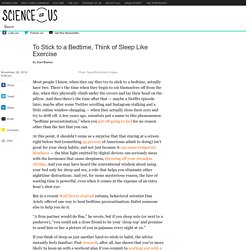
There’s the time when they begin to cut themselves off from the day, when they physically climb under the covers and lay their head on the pillow. And then there’s the time after that — maybe a Netflix episode later, maybe after some Twitter scrolling and Instagram stalking and a little online window-shopping — when they actually close their eyes and try to drift off. A few years ago, scientists put a name to this phenomenon: “bedtime procrastination,” when you put off going to bed for no reason other than the fact that you can. At this point, it shouldn’t come as a surprise that that staring at a screen right before bed (something 95 percent of Americans admit to doing) isn’t great for your sleep habits, and not just because it can cause temporary blindness — the blue light emitted by digital devices can seriously mess with the hormones that cause sleepiness, throwing off your circadian rhythm.
Study Finds Memory Has a Fascinating Effect On Sleep. Poor sleep’s negative effect on memory is well-known, but what about the effect of memory on sleep?

It’s long been known that animals — from flies to humans — have trouble with their memory when they don’t get enough sleep. Getting enough sleep is critical in converting short-term memories into long-term memories. Sleep makes your memories stronger, and helps with creativity. As humans, we spend about a third of our lives asleep.
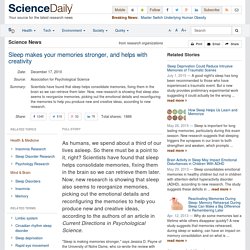
So there must be a point to it, right? Scientists have found that sleep helps consolidate memories, fixing them in the brain so we can retrieve them later. Now, new research is showing that sleep also seems to reorganize memories, picking out the emotional details and reconfiguring the memories to help you produce new and creative ideas, according to the authors of an article in Current Directions in Psychological Science. "Sleep is making memories stronger," says Jessica D. Payne of the University of Notre Dame, who co-wrote the review with Elizabeth A. Sleeping on your side may clear waste from your brain most effectively. The brain’s glymphatic pathway clears harmful wastes, especially during sleep.

This lateral position could prove to be the best position for the brain-waste clearance process (credit: Stony Brook University) Sleeping in the lateral, or side position, as compared to sleeping on one’s back or stomach, may more effectively remove brain waste, and could reduce the chances of developing Alzheimer’s, Parkinson’s and other neurological diseases, according to researchers at Stony Brook University. Stony Brook University researchers discovered this in experiments with rodents by using dynamic contrast magnetic resonance imaging (MRI) to image the brain’s glymphatic pathway, a complex system that clears wastes and other harmful chemical solutes from the brain.
They also used kinetic modeling to quantify the CSF-ISF exchange rates in anesthetized rodents’ brains in lateral, prone, and supine positions. Their finding is published in the Journal of Neuroscience. The brain-waste clearing system. How to Sleep Well as You Age: Tips for Overcoming Insomnia and Sleeping Better Over 50. The importance of sleep for older adults No matter what your age, sleeping well is essential to your physical health and emotional well-being.

Get Better Sleep: 5 Powerful New Tips From Research. Ever have trouble getting to sleep?
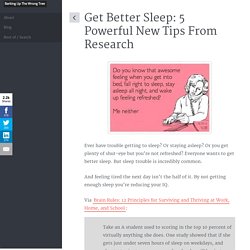
Or staying asleep? Or you get plenty of shut-eye but you’re not refreshed? How Sleep Deprivation Decays the Mind and Body - Seth Maxon. I awoke in a bed for the first time in days.
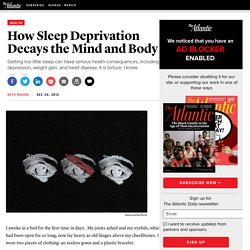
My joints ached and my eyelids, which had been open for so long, now lay heavy as old hinges above my cheekbones. I wore two pieces of clothing: an assless gown and a plastic bracelet. I remembered the hallway I had been wheeled down, and the doctor’s office where I told the psychiatrist he was the devil, but not this room. I forced myself up and stumbled, grabbing the chair and the bathroom doorknob for balance. I made it to the toilet, then threw water on my face at the sink, staring into the mirror in the little lavatory. In those first moments, I remembered the basics about what had landed me in the hospital: Some pseudo-philosophical ranting and flailing brought on by a poorly executed experiment to see how long I could last without sleep. I was 18, in Italy, on a school-sponsored trip with that pompously misnamed group for American teens who earn As and Bs, the National Honor Society.
Why? Dr. Poor sleep linked to toxic buildup of Alzheimer’s protein, memory loss. Sleep may be a missing piece in the Alzheimer’s disease puzzle.
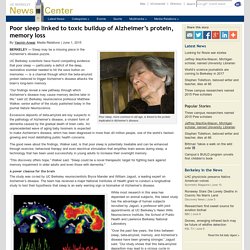
UC Berkeley scientists have found compelling evidence that poor sleep — particularly a deficit of the deep, restorative slumber needed to hit the save button on memories — is a channel through which the beta-amyloid protein believed to trigger Alzheimer’s disease attacks the brain’s long-term memory. “Our findings reveal a new pathway through which Alzheimer’s disease may cause memory decline later in life,” said UC Berkeley neuroscience professor Matthew Walker, senior author of the study published today in the journal Nature Neuroscience.
Less Sleep Pushes Your Brain to Age Faster. The First Real Reason We Need To Sleep. We know we need to sleep.

We know our brains and bodies work better after sleep. But what we didn't know, until now, was why. Scientists have just reported the first major mechanical reason our brains need to sleep — certain cleaning mechanisms in the brain work better when we shut the brain down. Just like how dump trucks take to the city streets during the pre-dawn hours because there's less traffic, our brain's cleaners also work best when there's less going on.
"This study shows that the brain has different functional states when asleep and when awake," study researcher Maiken Nedergaard, of the University of Rochester said in a statement. How to Lucid Dream: 15 Steps. Featured Article Categories: Featured Articles | Dreams.

The most important thing you’re probably ignoring? Sleep. You know what’s important? Sleep. More accurately, the stuff known as sleep hygiene. When it comes to well-being, sleep is the one area where the tiniest (and easiest) change can make the most difference. Less Sleep Pushes Your Brain to Age Faster. Sleep after learning strengthens connections between brain cells and enhances memory. In study published today in Science, researchers at NYU Langone Medical Center show for the first time that sleep after learning encourages the growth of dendritic spines, the tiny protrusions from brain cells that connect to other brain cells and facilitate the passage of information across synapses, the junctions at which brain cells meet.
Moreover, the activity of brain cells during deep sleep, or slow-wave sleep, after learning is critical for such growth. The Surprising Relationship Between Sleep and Learning. Before you start your next Udemy course, it’s best you get a good nights rest. Here is why: Meet Ed. He prides off thinking he only needs five hours of sleep a night. Study Shows How Sleep Improves Memory. BOSTON -- A good night's sleep triggers changes in the brain that help to improve memory, according to a new study led by researchers at Beth Israel Deaconess Medical Center (BIDMC). These findings, reported in the June 30, 2005, issue of the journal Neuroscience and currently published on-line, might help to explain why children -- infants, in particular -- require much more sleep than adults, and also suggest a role for sleep in the rehabilitation of stroke patients and other individuals who have suffered brain injuries.
"Our previous studies demonstrated that a period of sleep could help people improve their performance of 'memory tasks,' such as playing piano scales," explains the study's lead author Matthew Walker, PhD, director of BIDMC's Sleep and Neuroimaging Laboratory. "But we didn't know exactly how or why this was happening. In this new study, twelve healthy, college-aged individuals were taught a sequence of skilled finger movements, similar to playing a piano scale. Insomnia Causes, Cures & Treatments. Can’t sleep? Understanding insomnia and its symptoms Insomnia is the inability to get the amount of sleep you need to wake up feeling rested and refreshed. Because different people need different amounts of sleep, insomnia is defined by the quality of your sleep and how you feel after sleeping—not the number of hours you sleep or how quickly you doze off. 10 Things to Do Before You Go to Bed.
Everyone is obsessed with how successful people start their day. And if you’ve decided to do something about the quality of your life, you’ll start working on developing a morning routine and trying different versions of it. But we seem to forget that what productive people – those who work each day to achieve what they want and have hacked so many areas of their life – do before they go to bed is as important. The evening routine is one of the most underestimated habits, and yet an absolute must when it comes down to changing how your day goes and whether you want to get stuff done. Sleep Deprivation & Your Brain.